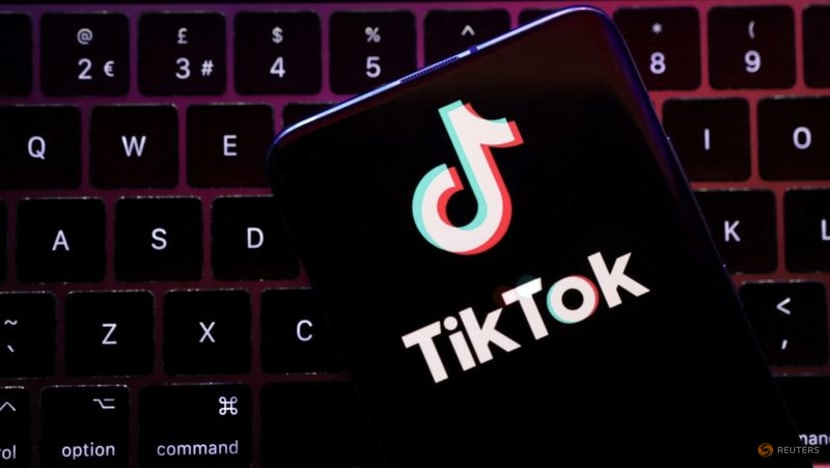Commentary: TikTok’s scammy shop insults users and hurts its business
A viral video of cheap Apple knockoff headphones for sale typifies TikTok’s irritating attempts to build an e-commerce platform, says Bloomberg Opinion's Dave Lee.

File image of TikTok app logo. (Image: Reuters:/Dado Ruvic)

This audio is generated by an AI tool.
NEW YORK: On TikTok Shop, the e-commerce bazaar from the popular video-sharing app, a truly fantastic deal is being offered. A user called Basketball World, showing details from Apple’s website, touts a 97 per cent discount on some of Apple’s luxury AirPod Max headphones. The usual price is US$549, Basketball World explains, but he’s selling them for just US$16 through TikTok.
It’s a scam, obviously. The headphones for sale are actually cheap Chinese-made knockoffs. But this is the reality of TikTok’s e-commerce blitz - a multibillion-dollar push into online shopping that risks driving away the users who made the app a success, bombarding them with low-rate copycat goods when what they truly want is the comedy, dancing and creativity to which they have grown accustomed.
That such a fraud would be offered to even a single user would be unacceptable. To offer it to 3.8 million people, as the video’s counter showed, is outright negligent. The video used Apple’s marketing material; the voiceover references the AirPod Max brand name; and #apple is written in the description - something you would think would trigger an immediate review.
To make matters worse, it was a paid sponsored post, something that should have meant it was subjected to a more strenuous review - by a human, perhaps - who could have taken the mere seconds necessary to determine it was a clear violation of multiple clauses in TikTok’s policy.
"NO FACTUAL BASIS"
The day after I brought the video to TikTok’s attention, it was taken down. Despite evidence of multiple moderation failings, and the vast reach, a company spokesperson told me by email that there was "no factual basis to support your claim that TikTok is negligent".
Apple wouldn’t comment directly on the video but noted that it took action to have “more than a million” listings removed from online marketplaces globally, "including TikTok".
Were customers fooled into thinking this was a genuine Apple product? Or even a high-quality copycat? You would assume not - not at that price. But that’s no defense for TikTok taking their money anyway.
If TikTok’s controls can’t stop trivially basic scams, I don’t hold much hope over the company’s ability to make sure the products meet Western safety standards. Many of the reviews, even the positive ones, talk about the product being damaged, faulty and arriving in a “beat up” box. “I wasn’t expecting studio quality for this price,” a one-star review read, “but I was expecting to actually hear the music.”
As well as pocketing whatever it did from the paid ad fee, TikTok also would have taken a single-digit percentage cut of the 32,700 sales - according to the app’s counter, which I’m not able to verify independently. Assuming that most buyers made use of the new-customer coupon, making the headphones US$8.38, that means pocketing a few thousand dollars in revenue, though it’s hard to determine exactly how much. (TikTok would not say.)
That hardly seems worth it. But it’s just one piece of ByteDance’s desperate attempts to emulate what it has achieved in China, where Douyin - the name of TikTok’s Chinese equivalent - has provided the backbone for an e-commerce business that competes with local giants like Alibaba and JD.com.
IN THE FIRING LINE
In the US, ByteDance sees a chance to drive more than US$17 billion in sales this year and become a bonafide competitor to Amazon.com. Or, more to the point, take on Temu and Shein, two other Chinese-owned sites that are also making a handy trade in selling cheap goods to Americans.
TikTok needs to be careful. There are already calls to block Temu sales in the US over concerns that forced labour is being used to make its ultra-cheap products. What assurances can TikTok give that items in TikTok Shop, many of which are also on sale on Temu, don’t originate from similar abuses? (TikTok declined to comment.)
The app is already in the firing line over data privacy and its Chinese ownership - a storm over an untrustworthy e-commerce store might be what tips Congress over the edge in seeking an outright ban.
Even without political intervention, TikTok’s descent is a gift for Meta Platforms. For the past couple of years, Mark Zuckerberg has been glancing nervously at TikTok, worried it was going to capture the next generation away from Instagram. Fortunately for him, TikTok has proved to be even more clumsy with its efforts to monetise.
And, according to research from Pew, the invasion of the olds has been swift - 40 per cent of TikTok users in the US today are in their 30s and 40s, and that group is growing faster than any other. TikTok Shop is the inevitable byproduct of this demographic. Some of its most popular products are the kind you might have previously seen on QVC, or in one of those unfathomably long and dull infomercials.
The flea marketifcation of what had been the fastest growing social network in the US hasn’t gone unnoticed by users, and despite considerable bad press, the company is achieving little in addressing concerns. Videos from popular users like Brody Wellmaker reflect the mood. “I’m not gonna shop on TikTok Shop!” he screams at the camera, prompting more than 45,000 comments united in agreement.
Users would much rather the company invest in repairing its broken relationship with Universal Music Group, which has caused millions of songs to disappear from the platform, than shove its e-commerce strategy down their throats. ByteDance needs to ask whether its experimental, low-rent shop is really worth the damage it’s doing to what made TikTok worth using in the first place.

















